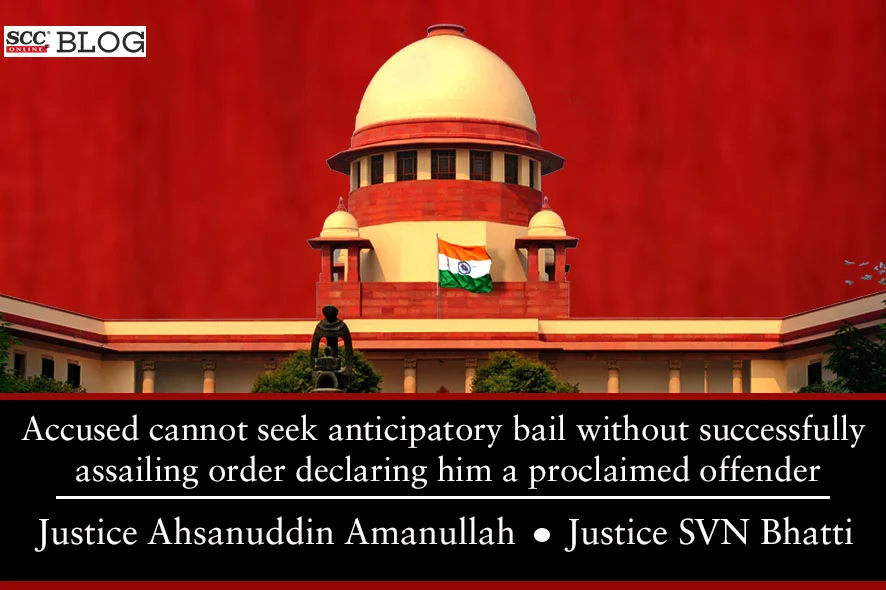Supreme Court: In an appeal, filed by the State of Haryana seeking cancellation of anticipatory bail granted to the accused vide Order dated 03-12-2021 passed by the Punjab and Haryana High Court, the division bench of Ahsanuddin Amanullah and SVN Bhatti, JJ. said that the accused, without first successfully assailing the order declaring him as a proclaimed offender, could not have proceeded to seek anticipatory bail. Thus, it was held that the accused’s application under Section 438 of the Code of Criminal Procedure, 1973 (‘CrPC’) should not have been entertained, as he was a proclaimed offender.
The respondent was accused under Sections 147, 148, 149, 323, 325, 341, 342 and 427 of the Penal Code, 1860 (‘IPC’). Later, Sections 186, 353 and 364 of the IPC were also included.
The State submitted that in the background of the nature of the allegations and the materials collected as well as the accused having been declared a proclaimed offender, grant of indulgence under Section 438 CrPC was erroneous and misplaced. It was submitted that there is enough evidence to show the complicity of the accused and further, based on this very order, other co-accused persons have been granted the benefit of anticipatory bail, which does not serve the larger public interest.
The Court, after taking note of the factors to guide the grant of bail, said that liberty is not to be interfered with easily. More so, when an order of prearrest bail already stands granted by the High Court.
As per the Court, much like bail, the grant of anticipatory bail is to be exercised with judicial discretion. The fate of each case depends on its own facts and merits. Thus, after taking note of the facts and circumstances of the present case, the Court said that it was not proper for the High Court to have granted anticipatory bail to the accused.
The Court was surprised with the logic of the High Court in granting anticipatory bail to the accused, by placing reliance on Arnesh Kumar v. State of Bihar, (2014) 8 SCC 273 to the effect that where the offence is punishable with imprisonment for a term which may be less than seven years or which may extend to seven years, whether with or without fine, there is to be no automatic arrest. As Section 364 IPC carries a term of imprisonment for life or rigorous imprisonment of ten years and fine, the Court was perplexed as to how, despite addition of Section 364 IPC, the High Court took the view that Arnesh Kumar (supra) would aid the accused in his quest for pre-arrest bail.
The Court said that the High Court lost sight of the fact that the accused was a declared proclaimed offender. It was not correct for the High Court to brush aside such factum, based on averments alone, purporting to explain the backdrop of such declaration by mere advertence to a similar-sounding name, in the petition before it, as recorded in the impugned order.
Further, there was a declaration of the accused as a proclaimed offender, and such declaration was subsisting on the date of the impugned order, thus, the Court disagreed with the High Court that the accused was entitled to ‘reform and course correct’.
The Court further said that the accused, without first successfully assailing the order declaring him as a proclaimed offender, could not have proceeded to seek anticipatory bail. Thus, it was held that the accused’s application under Section 438 CrPC should not have been entertained, as he was a proclaimed offender.
After taking note of Lavesh v. State (NCT of Delhi), (2012) 8 SCC 730 and State of M.P. v. Pradeep Sharma, (2014) 2 SCC 171, wherein the Court emphasised that a proclaimed offender would not be entitled to anticipatory bail. However, in an exceptional and rare case, Supreme Court or the High Courts can consider a plea seeking anticipatory bail, despite the applicant being a proclaimed offender, given that the Supreme Court and High Courts are Constitutional Courts. However, the Court said that no exceptional situation arises in the case at hand. Thus, it set aside the impugned order granting anticipatory bail to the accused and directed him to surrender before the Court concerned within four weeks from the date of this judgment and allowed him to seek regular bail.
[State of Haryana v Dharamraj, 2023 SCC OnLine SC 1085, Decided on 29-08-2023]
*Judgment Authored by: Justice Ahsanuddin Amanullah
Know Thy Judge | Supreme Court of India: Justice Ahsanuddin Amanullah









